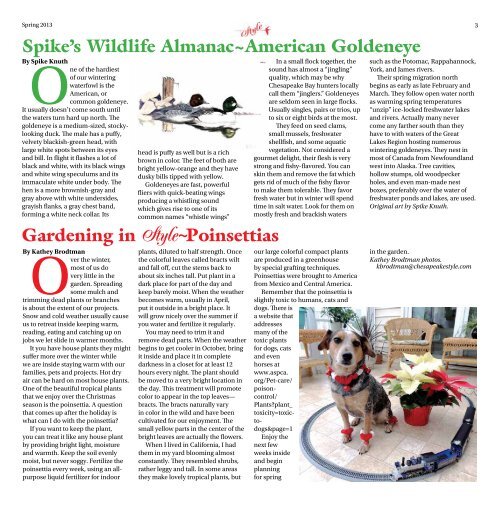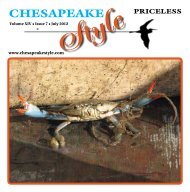Chesapeake Style Online
Chesapeake Style Online
Chesapeake Style Online
You also want an ePaper? Increase the reach of your titles
YUMPU automatically turns print PDFs into web optimized ePapers that Google loves.
Spring 2013 3<br />
Spike’s Wildlife Almanac~American Goldeneye<br />
By Spike Knuth<br />
One of the hardiest<br />
of our wintering<br />
waterfowl is the<br />
American, or<br />
common goldeneye.<br />
It usually doesn’t come south until<br />
the waters turn hard up north. e<br />
goldeneye is a medium-sized, stockylooking<br />
duck. e male has a puy,<br />
velvety blackish-green head, with<br />
large white spots between its eyes<br />
and bill. In ight it ashes a lot of<br />
black and white, with its black wings<br />
and white wing speculums and its<br />
immaculate white under body. e<br />
hen is a more brownish-gray and<br />
gray above with white undersides,<br />
grayish anks, a gray chest band,<br />
forming a white neck collar. Its<br />
head is puy as well but is a rich<br />
brown in color. e feet of both are<br />
bright yellow-orange and they have<br />
dusky bills tipped with yellow.<br />
Goldeneyes are fast, powerful<br />
iers with quick-beating wings<br />
producing a whistling sound<br />
which gives rise to one of its<br />
common names “whistle wings”<br />
Gardening in <strong>Style</strong>~Poinsettias<br />
By Kathey Brodtman<br />
Over the winter,<br />
most of us do<br />
very little in the<br />
garden. Spreading<br />
some mulch and<br />
trimming dead plants or branches<br />
is about the extent of our projects.<br />
Snow and cold weather usually cause<br />
us to retreat inside keeping warm,<br />
reading, eating and catching up on<br />
jobs we let slide in warmer months.<br />
It you have house plants they might<br />
suer more over the winter while<br />
we are inside staying warm with our<br />
families, pets and projects. Hot dry<br />
air can be hard on most house plants.<br />
One of the beautiful tropical plants<br />
that we enjoy over the Christmas<br />
season is the poinsettia. A question<br />
that comes up after the holiday is<br />
what can I do with the poinsettia?<br />
If you want to keep the plant,<br />
you can treat it like any house plant<br />
by providing bright light, moisture<br />
and warmth. Keep the soil evenly<br />
moist, but never soggy. Fertilize the<br />
poinsettia every week, using an allpurpose<br />
liquid fertilizer for indoor<br />
plants, diluted to half strength. Once<br />
the colorful leaves called bracts wilt<br />
and fall o, cut the stems back to<br />
about six inches tall. Put plant in a<br />
dark place for part of the day and<br />
keep barely moist. When the weather<br />
becomes warm, usually in April,<br />
put it outside in a bright place. It<br />
will grow nicely over the summer if<br />
you water and fertilize it regularly.<br />
You may need to trim it and<br />
remove dead parts. When the weather<br />
begins to get cooler in October, bring<br />
it inside and place it in complete<br />
darkness in a closet for at least 12<br />
hours every night. e plant should<br />
be moved to a very bright location in<br />
the day. is treatment will promote<br />
color to appear in the top leaves—<br />
bracts. e bracts naturally vary<br />
in color in the wild and have been<br />
cultivated for our enjoyment. e<br />
small yellow parts in the center of the<br />
bright leaves are actually the owers.<br />
When I lived in California, I had<br />
them in my yard blooming almost<br />
constantly. ey resembled shrubs,<br />
rather leggy and tall. In some areas<br />
they make lovely tropical plants, but<br />
In a small ock together, the<br />
sound has almost a “jingling”<br />
quality, which may be why<br />
<strong>Chesapeake</strong> Bay hunters locally<br />
call them “jinglers.” Goldeneyes<br />
are seldom seen in large ocks.<br />
Usually singles, pairs or trios, up<br />
to six or eight birds at the most.<br />
ey feed on seed clams,<br />
small mussels, freshwater<br />
shellsh, and some aquatic<br />
vegetation. Not considered a<br />
gourmet delight, their esh is very<br />
strong and shy-avored. You can<br />
skin them and remove the fat which<br />
gets rid of much of the shy avor<br />
to make them tolerable. ey favor<br />
fresh water but in winter will spend<br />
time in salt water. Look for them on<br />
mostly fresh and brackish waters<br />
our large colorful compact plants<br />
are produced in a greenhouse<br />
by special grafting techniques.<br />
Poinsettias were brought to America<br />
from Mexico and Central America.<br />
Remember that the poinsettia is<br />
slightly toxic to humans, cats and<br />
dogs. ere is<br />
a website that<br />
addresses<br />
many of the<br />
toxic plants<br />
for dogs, cats<br />
and even<br />
horses at<br />
www.aspca.<br />
org/Pet-care/<br />
poisoncontrol/<br />
Plants?plant_<br />
toxicity=toxictodogs&page=1<br />
Enjoy the<br />
next few<br />
weeks inside<br />
and begin<br />
planning<br />
for spring<br />
such as the Potomac, Rappahannock,<br />
York, and James rivers.<br />
eir spring migration north<br />
begins as early as late February and<br />
March. ey follow open water north<br />
as warming spring temperatures<br />
“unzip” ice-locked freshwater lakes<br />
and rivers. Actually many never<br />
come any farther south than they<br />
have to with waters of the Great<br />
Lakes Region hosting numerous<br />
wintering goldeneyes. ey nest in<br />
most of Canada from Newfoundland<br />
west into Alaska. Tree cavities,<br />
hollow stumps, old woodpecker<br />
holes, and even man-made nest<br />
boxes, preferably over the water of<br />
freshwater ponds and lakes, are used.<br />
Original art by Spike Knuth.<br />
in the garden.<br />
Kathey Brodtman photos.<br />
kbrodtman@chesapeakestyle.com



